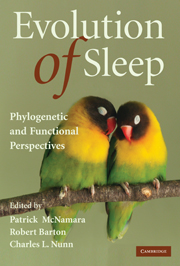Book contents
- Frontmatter
- Contents
- Contributors
- Acknowledgments
- Introduction
- 1 Ecological constraints on mammalian sleep architecture
- 2 Sleep in insects
- 3 Schooling by continuously active fishes: Clues to sleep's ultimate function
- 4 What exactly is it that sleeps? The evolution, regulation, and organization of an emergent network property
- 5 Evolutionary medicine of sleep disorders: Toward a science of sleep duration
- 6 Primate sleep in phylogenetic perspective
- 7 A bird's-eye view of the function of sleep
- 8 The evolution of wakefulness: From reptiles to mammals
- 9 The evolution of REM sleep
- 10 Toward an understanding of the function of sleep: New insights from mouse genetics
- 11 Fishing for sleep
- Index
- Plate section
- References
1 - Ecological constraints on mammalian sleep architecture
Published online by Cambridge University Press: 10 March 2010
- Frontmatter
- Contents
- Contributors
- Acknowledgments
- Introduction
- 1 Ecological constraints on mammalian sleep architecture
- 2 Sleep in insects
- 3 Schooling by continuously active fishes: Clues to sleep's ultimate function
- 4 What exactly is it that sleeps? The evolution, regulation, and organization of an emergent network property
- 5 Evolutionary medicine of sleep disorders: Toward a science of sleep duration
- 6 Primate sleep in phylogenetic perspective
- 7 A bird's-eye view of the function of sleep
- 8 The evolution of wakefulness: From reptiles to mammals
- 9 The evolution of REM sleep
- 10 Toward an understanding of the function of sleep: New insights from mouse genetics
- 11 Fishing for sleep
- Index
- Plate section
- References
Summary
Introduction: sleep and ecology
All mammals so far studied experience some form of sleep. When mammals are sleep-deprived, they generally attempt to regain the lost sleep by exhibiting a “sleep rebound,” suggesting that sleep serves important functions that cannot be neglected (Siegel, 2008; Zepelin, 1989; Zepelin, Siegel, & Tobler, 2005). When sleep deprivation is enforced on individuals, it is accompanied by impaired physiological functions and a deterioration of cognitive performance (Kushida, 2004; Rechtschaffen, 1998; Rechtschaffen & Bergmann, 2002). In the rat, prolonged sleep deprivation ultimately results in death (Kushida, 2004; Rechtschaffen & Bergmann, 2002). Together, these observations suggest that sleep is a fundamental requirement for mammalian life, and much research has focused on identifying the physiological benefits that sleep provides (Horne, 1988; Kushida, 2004).
Are there also costs associated with sleep? If so, what are the selective pressures that constrain the amount of time that individuals can devote to sleep? Sleep is probably associated with “opportunity costs” because sleeping animals cannot pursue other fitness-enhancing activities, such as locating food, maintaining social bonds, or finding mates. Sleeping animals may also pay direct costs. For example, sleep is a state of reduced consciousness, and thus sleeping individuals are less able to detect and escape from approaching predators (Allison & Cicchetti, 1976; Lima, Rattenborg, Lesku, et al., 2005). These ecological factors are likely to be important constraints on sleep durations and may also affect how sleep is organized over the daily cycle.
Information
- Type
- Chapter
- Information
- Evolution of SleepPhylogenetic and Functional Perspectives, pp. 12 - 33Publisher: Cambridge University PressPrint publication year: 2009
References
Accessibility standard: Unknown
Why this information is here
This section outlines the accessibility features of this content - including support for screen readers, full keyboard navigation and high-contrast display options. This may not be relevant for you.Accessibility Information
- 3
- Cited by
